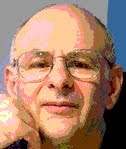 We wait
We waitfor this
and that.
We leave the present
and live
in the future.
Siddhartha learned to wait, saying
"the greatest prayer
is patience."
Did he learn to be so mindful
of the present
that the future did not matter?
My job soon changes
from working for someone else
to working for myself.
And then,
in a number of days/months/years,
I will sit in a rocking chair
creaking as it rocks,
and wonder when
eternal sleep will knock at my door.
We wait for a semester to start,
for a class to begin,
for a class to end.
We wait in line
at the grocery store,
imagining
that someone else is
stealing our precious life
from ourselves.
When's dinner,
we ask?
wondering how we can
shorten that time,
until our perceived needs
(or wants?) are fulfilled.
An alternative, you ask?
The water will boil
whether or not
we watch
the pot.
What could we do
in the meantime
so we are living,
rather than waiting?


















